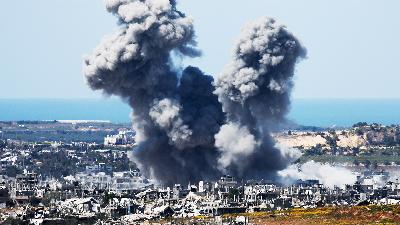End the Military Exemption from Climate Mitigation
Thursday, April 4, 2024
Emissions from conflicts and the military sector damage the environment. This is often ignored because of global political pressures.
arsip tempo : 174557768293.

WAR, with all its brutality, always presents a horrifying picture of the destruction of human lives and property. The Israeli military attack on Gaza, for example, has killed more than 31,000 people. Russia’s invasion of Ukraine has caused more than 30,000 civilian deaths. Aside from this, what is often ignored is the environmental damage caused by conflicts that can in the longer term be even more dangerous to human life.
If we care about the future of this planet, it is time we demanded the military take responsibility for environmental destruction caused by conflicts. Israel’s invasion of Gaza and Russia’s invasion of Ukraine, for example, have resulted in enormous environmental destruction. The use of chemicals and weapons has damaged the soil, contaminated water sources, and is even a threat to the sustainability of maritime ecosystems.
As well as this, the greenhouse gases released by conflicts also contribute to global warming. In just 60 days since Israel launched its attack on Gaza, 281 million equivalent tons of carbon dioxide (CO2) have been released. And in Russia’s war in Ukraine, emissions so far have been around 150 million equivalent tons of CO2.
According to calculations carried out by the Conflict and Environment Observatory, the military sector contributes 5.5 percent of global emissions. This is far greater than the emissions from the industry sector (5.2 percent) or garbage (3.2 percent).
What is surprising is that although conflicts and military activities produce such huge amounts of emissions, the topic very rarely becomes the focus of global discussion. At the COP28 climate change conference in Dubai, United Arab Emirates, in December 2023, for example, discussions or negotiations about emissions from conflicts and the military were not on the agenda.
Global political pressure is one factor influencing the lack of discussions on military emissions. The obligation for the military sector to produce emission reports was even removed from the Kyoto Protocol—an international treaty to reduce greenhouse gas emissions adopted in 1997—because of pressure from the United States.
The 2015 Paris Agreement did try to regulate the reporting of emissions from the military sector, but the actual implementation was very unsatisfactory. Developed nations still ‘do as they please’ when it comes to reporting whether there are any admissions from the military sector or on any efforts to mitigate them. Nobody has the courage to force them to do so.
The military exemption from environmental responsibility must be ended as the danger of global warming is becoming ever more real. Natural disasters such as droughts, extreme weather and floods are becoming more frequent—and are causing massive economic losses. A study published in the journal Nature estimates that losses as a result of climate change have reached US$143 billion per year.
This is why discussions on emissions from conflicts and the military sector should be on the agenda of COP27 in Baku, Azerbaijan. All the nations participating in the conference must oblige their militaries to report emissions and efforts to mitigate them. Some developed nations should also be asked to pay compensation for the environmental damage caused by their military actions.
We cannot close our eyes to the environmental damage caused by conflicts and military activities. Now is the time to demand that nations who trigger conflicts pay compensation to help save the planet. If not now, when?











